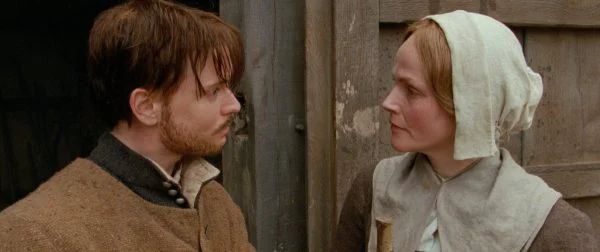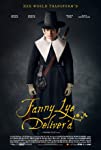Eye For Film >> Movies >> Fanny Lye Deliver’d (2019) Film Review
Fanny Lye Deliver’d
Reviewed by: Jennie Kermode

The world is upside down. War has ravaged England and the King - a man once thought to be appointed by God - has been killed. To see the little farm where Fanny Lye (Maxine Peake) lives, however, one wouldn't know it. There she stays with her husband John (Charles Dance) and young son Arthur (Zak Adams), engaged in patient drudgery, expecting little better from life but broadly satisfied that things are not worse - until the day when the three of them return home from church to see smoke rising from their chimney.
Director Thomas Clay's previous work has shown that he's a filmmaker of singular vision, ready to devote himself to a subject and spend years getting to know it before his work comes to fruition. This film is no exception. It's a fascinating take on a period rarely addressed in cinema (Michael Reeves' Matthew Hopkins: Witchfinder General being one of the few prominent works that springs to mind), addressing some of the theological and intellectual shifts that marked England's most important contributions to global thought, and it's also an absorbing drama with complex characters and a strong narrative thrust. Styled like a western, it fully inhabits a period when authority was uncertain, lawlessness was rife, holding certain sets of ideas could get a person killed and yet new ideas were accessible - even to ordinary women like Fanny - as they had never been before.

The changes in Fanny's life hinge on the arrival of the strangers Thomas (Freddie Fox) and Rebecca (Tanya Reynolds), both of whom are Ranters - members of a group of radical thinkers who opposed the private ownership of property, celebrated the free expression of sexuality, denied the primacy of scripture and urged individuals to seek the divine within themselves. To John, they are abominable heretics clearly bent on destruction, but to Fanny they are first and foremost human beings, deserving of care and attention. This makes her vulnerable - Thomas may not be as decent and spiritual a man as he first seems - but it also means she's open to growth and to enlarging her understanding of the world in a way that might make her more than a match for anyone. If she lives long enough. Thomas is in possession of a secret item much coveted by others, and that could bring doom to them all.
With formal narration which captures the style of the period and similarly distinctive dialogue, the film quickly immerses viewers in its small but volatile world. The soundtrack, which Clay composed himself, uses only instruments in use at the time, and even the farm buildings were built from scratch using traditional methods. The plainness of Puritan attire gives the central cast more room to define their characters. Though Dance draws on some he has played in the past, he leaves space to subvert expectations. Fox has the courage to play a weak man but the sophistication not to make it too obvious. Reynolds is remarkable in her first screen role, but it is, properly, Peake who really excels, with a commanding screen presence that makes us root for Fanny even when she's quiet and meek, makes it fascinating to see her beginning to explore her potential.
There's more to all of these characters than first meets the eye, with some secrets that might be obvious if we gave them a little thought buried deep. This is a tale without mercy, horrors building one upon another as the pace picks up, but there is sweetness, too, in unexpected places, and a real sense of the importance of the bonds between troubled individuals. Told plainly but with the absolute confidence essential to the western genre, this is a masterful piece of work, and whilst it may not immediately reach a huge audience - despite a screening as part of the Edinburgh International Film Festival's online selection - it seems destined to be regarded as a classic.
Reviewed on: 25 Jun 2020















